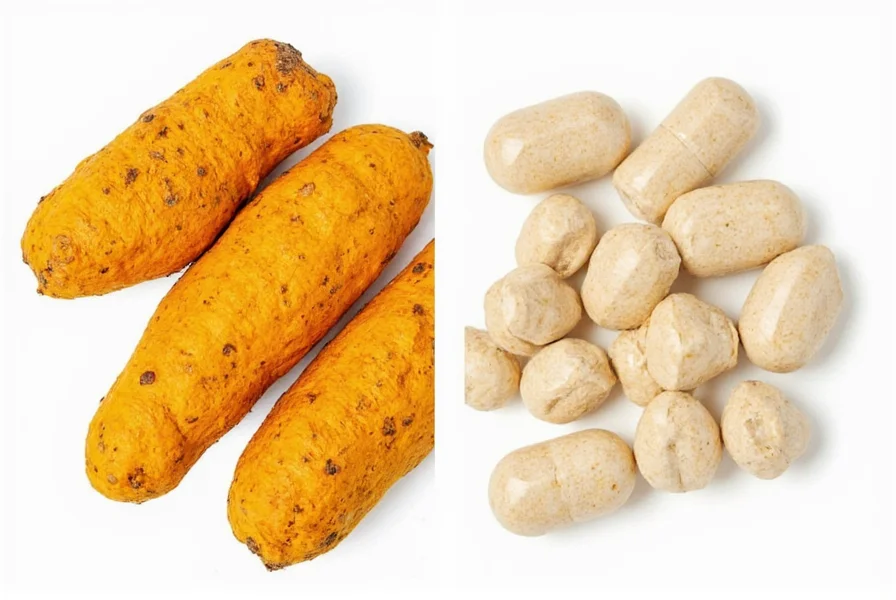Curcumin, the active compound in turmeric, has gained significant attention for its potent anti-inflammatory and antioxidant properties. Understanding the proper turmeric supplementation dosage is crucial for maximizing benefits while ensuring safety. This comprehensive guide provides evidence-based recommendations for various health goals and populations.
Understanding Turmeric and Curcumin Bioavailability
Raw turmeric root contains only about 3% curcumin by weight, which explains why therapeutic effects require concentrated forms. The critical factor many overlook is curcumin's notoriously poor bioavailability—without enhancement, your body absorbs less than 1% of standard curcumin. This is why most clinical studies use formulations with absorption enhancers.

Recommended Dosage Guidelines by Purpose
| Purpose | Standard Dosage | Duration | Formulation Recommendation |
|---|---|---|---|
| General wellness | 500 mg once or twice daily | Ongoing | Curcumin with piperine (95% curcuminoids) |
| Inflammation management | 1,000-1,500 mg twice daily | 8-12 weeks | Liposomal or nanoparticle curcumin |
| Joint health support | 1,000 mg three times daily | 3-6 months | Curcumin with turmeric essential oils |
| Cognitive support | 90 mg standardized extract twice daily | Ongoing | Longvida® curcumin formulation |
Factors Influencing Your Optimal Turmeric Dosage
Your ideal turmeric intake depends on several individual factors that many generic dosage charts ignore. Body weight significantly impacts effective dosing—research suggests 12-15 mg of curcumin per kilogram of body weight provides optimal blood concentrations. A 70 kg (154 lb) adult would therefore require approximately 840-1,050 mg daily for therapeutic effects.
Health conditions dramatically alter requirements. People with metabolic syndrome may need higher doses due to altered absorption, while those with gallbladder issues must use lower amounts. The timing of consumption matters too—taking turmeric with healthy fats like avocado or olive oil can increase absorption by 7-8 times compared to taking it on an empty stomach.
Safety Considerations and Maximum Limits
The acceptable daily intake of curcumin is generally considered to be up to 8,000 mg, but this represents an absolute upper limit rather than a recommended dose. Most adverse effects occur only at extremely high doses beyond what's typically used. Common side effects at excessive doses include gastrointestinal discomfort, nausea, and diarrhea.
Certain populations require special caution: individuals taking blood thinners should consult their physician before using turmeric supplements, as curcumin has mild anticoagulant properties. Those with gallstones should avoid high doses as turmeric may stimulate gallbladder contraction. Pregnant women should limit intake to culinary amounts unless under medical supervision.
Choosing the Right Turmeric Supplement Format
The form of turmeric you select directly impacts your effective dosage. Standardized extracts specifying curcuminoid percentages provide the most reliable dosing. When determining how much turmeric powder per day to take, remember that 1 teaspoon of ground turmeric contains only about 200 mg of curcumin—meaning you'd need to consume 2.5 teaspoons daily to reach a 500 mg curcumin dose.
For those seeking natural anti-inflammatory turmeric dosage recommendations without supplements, incorporating 1-3 grams of fresh turmeric root or 1-2 teaspoons of powder into meals provides culinary benefits, though therapeutic effects require higher concentrations. Golden milk recipes typically contain 1-2 teaspoons of turmeric powder per serving, delivering approximately 400-800 mg of curcumin.
When to Consult a Healthcare Professional
Before starting any new supplement regimen, especially if you have underlying health conditions or take medications, consult with a healthcare provider. This is particularly important if you're considering high-dose turmeric for arthritis pain relief or other specific therapeutic purposes. A qualified practitioner can help determine your personalized turmeric dosage based on your health status, medications, and goals.
Monitoring Your Response to Turmeric Supplementation
Track your body's response during the first 4-6 weeks of supplementation. Many people notice reduced joint stiffness within 2-3 weeks when taking appropriate anti-inflammatory turmeric dosage amounts. If you experience no benefits after 8 weeks at the recommended dose, consult your healthcare provider before increasing the amount, as higher doses don't always yield better results and may cause side effects.











 浙公网安备
33010002000092号
浙公网安备
33010002000092号 浙B2-20120091-4
浙B2-20120091-4